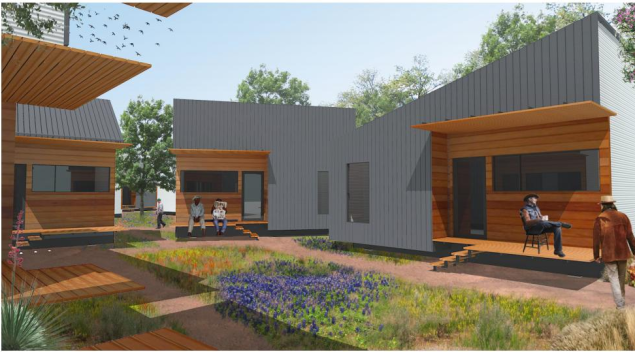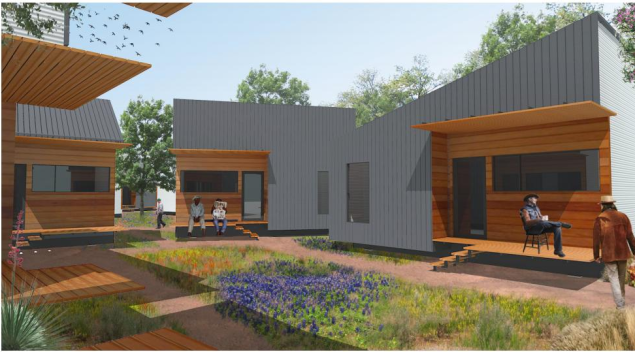
Yesterday the Guardian wrote about the Cottages at Hickory Crossing, a development of 50 units of permanent supportive housing set to open in April. They’re being built by nonprofit CitySquare on a patch of land right about where interstates 30 and 45 meet.
The project is a housing-first approach to dealing with chronically homeless people who cost the county considerable money when they end up regularly at Parkland or in jail. By providing these people homes, as well as services to treat mental health issues, the hope is that both these residents and the county come out ahead:
The process of selecting tenants is under way. It began by identifying the 300 most expensive homeless people in the county, based on their cost to city services such as the health and prison systems.
“We will have 50 of the most expensive homeless persons. The average cost per person on this list of 300 to the county alone, not counting the city or nonprofit organisations, is over $40,000 a year to stay outside. We’re going to provide a gated community with security, seven day a week mental health services, really good housing – platinum LEED certified – every house has a bedroom scaled to queen-sized furniture, a living room, kitchen and a bath, a nice front porch. Less than $15,000 a year is what it costs to provide that kind of housing,” [Larry James, CitySquare CEO] says.
All for a rent of 30% of the tenant’s monthly income – whether it is $1,000 or $10. The only requirement? “Be a good tenant,” James says. That means no criminal or disruptive behaviour; but no pressure on residents to immediately go sober if they are addicted to alcohol, for example. Help will be on hand when they are ready.
Dallas is far from the first city to embrace this solution. Reading about CitySquare’s efforts reminded me of Malcolm Gladwell’s 2006 New Yorker piece on housing-first solutions (including those in Denver). He beautifully articulated the contradictory feelings raised in many of us when we read about projects like these:
From an economic perspective the approach makes perfect sense. But from a moral perspective it doesn’t seem fair. Thousands of people in the Denver area no doubt live day to day, work two or three jobs, and are eminently deserving of a helping hand—and no one offers them the key to a new apartment. Yet that’s just what the guy screaming obscenities and swigging Dr. Tich gets. When the welfare mom’s time on public assistance runs out, we cut her off. Yet when the homeless man trashes his apartment we give him another. Social benefits are supposed to have some kind of moral justification. We give them to widows and disabled veterans and poor mothers with small children. Giving the homeless guy passed out on the sidewalk an apartment has a different rationale. It’s simply about efficiency.
We also believe that the distribution of social benefits should not be arbitrary. We don’t give only to some poor mothers, or to a random handful of disabled veterans. We give to everyone who meets a formal criterion, and the moral credibility of government assistance derives, in part, from this universality. But the Denver homelessness program doesn’t help every chronically homeless person in Denver. There is a waiting list of six hundred for the supportive-housing program; it will be years before all those people get apartments, and some may never get one. There isn’t enough money to go around, and to try to help everyone a little bit—to observe the principle of universality—isn’t as cost-effective as helping a few people a lot. Being fair, in this case, means providing shelters and soup kitchens, and shelters and soup kitchens don’t solve the problem of homelessness. Our usual moral intuitions are little use, then, when it comes to a few hard cases. Power-law problems leave us with an unpleasant choice. We can be true to our principles or we can fix the problem. We cannot do both.
How has it worked out Denver? Well, in January the city council there approved new contracts to provide housing and services to 250 chronically homeless people. And they’re partially financing the effort through the sale of something called Social Impact Bonds, where private investors are loaning the money to pay to get the project up and running and can be paid back via the savings the city realizes in lowering the estimated cost that the project’s residents would have run up if they’d still been living on the street. Sounds like a scheme for expansion worth Dallas considering if Hickory Crossing proves a success.





